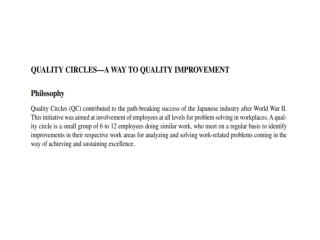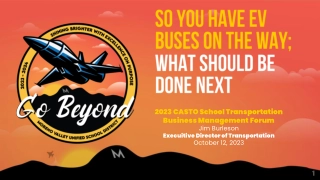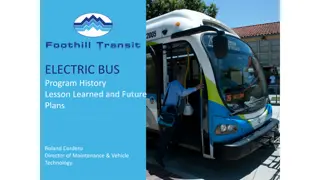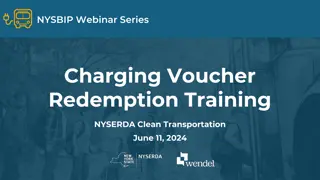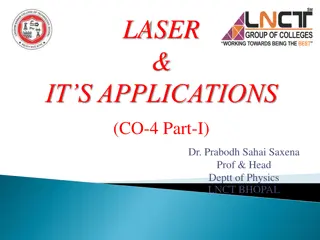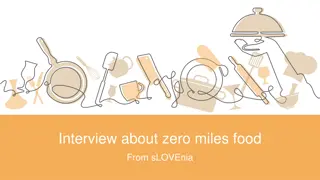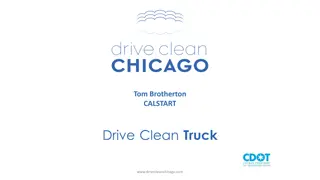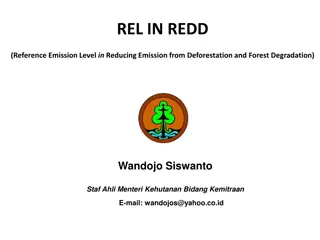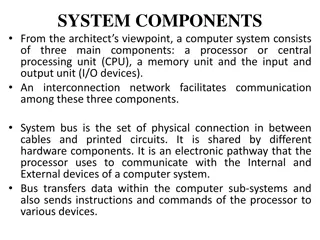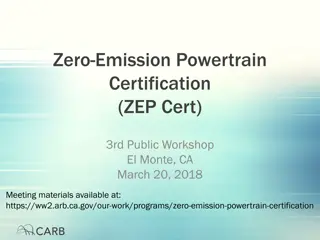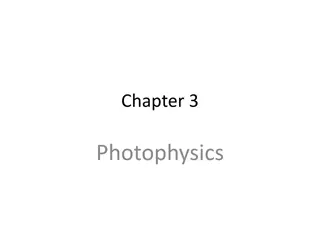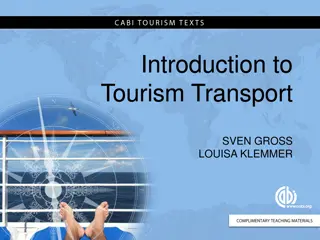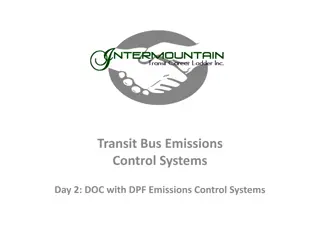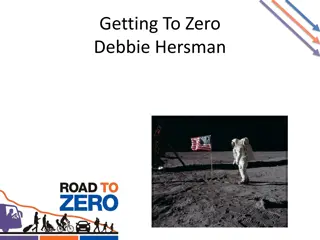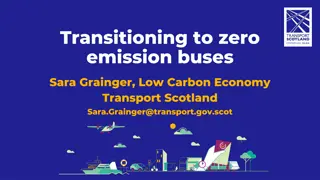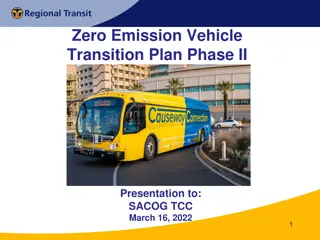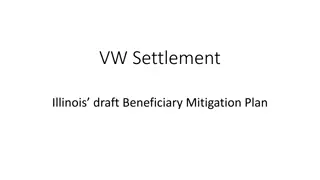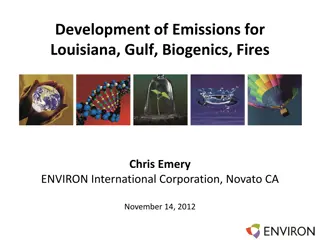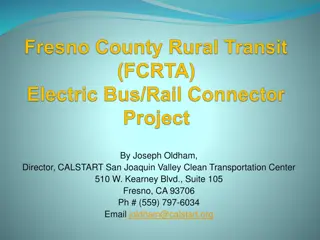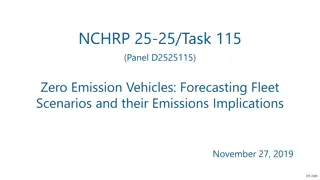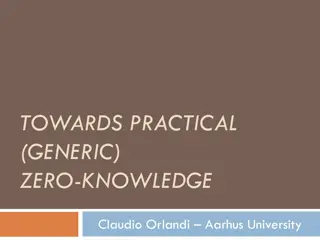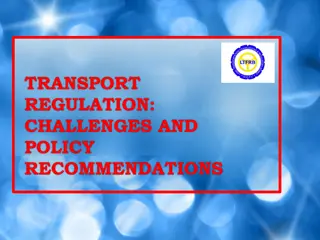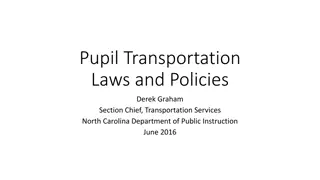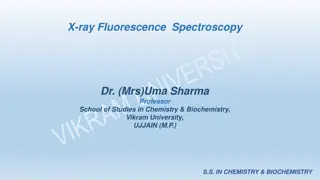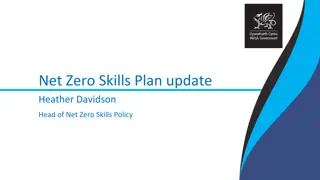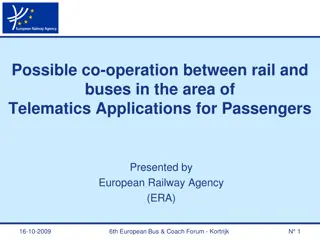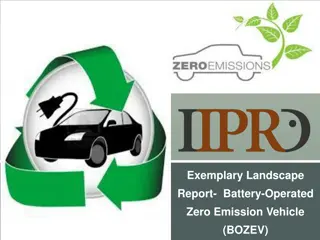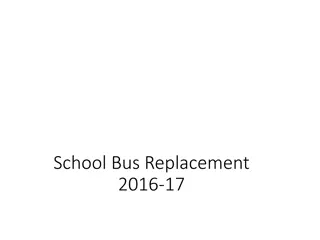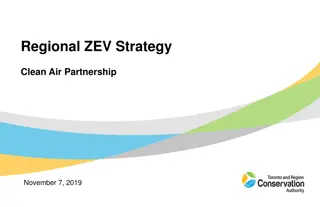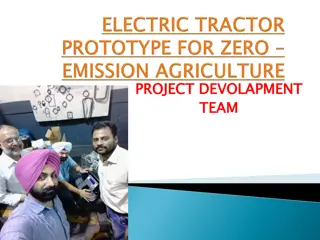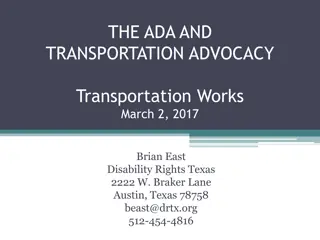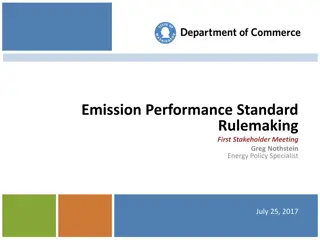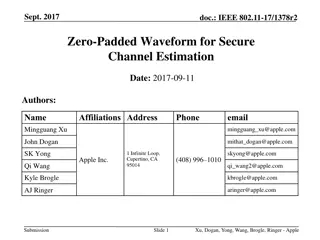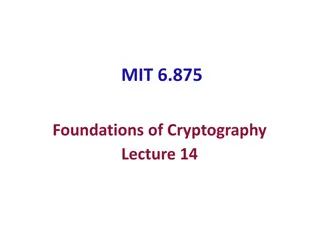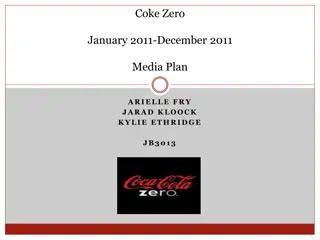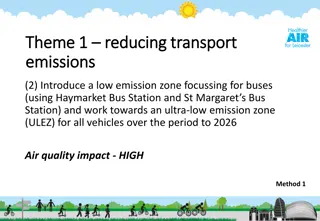Zero Defects Philosophy in Quality Management
Zero Defects Philosophy is a key principle in Total Quality Management, advocating for perfection in products and processes by eliminating defects completely. Philip Crosby popularized this concept, emphasizing that defects are never acceptable. Key concepts include "Quality is Free" and "Do It Righ
0 views • 19 slides
Efficient Planning for Electric School Bus Implementation
Prepare for the transition to electric school buses by focusing on team collaboration, strategic planning, and effective communication. Understand route details, battery capacity, and charging infrastructure requirements. Collaborate with utilities, optimize charging schedules, and ensure seamless i
2 views • 18 slides
The Road to Net Zero: Importance of Data Collection in Energy Management and Consulting
Cotopaxi, a leading energy consultancy, highlights the significance of data collection in achieving net-zero emissions. Mark Jones, a senior energy engineer, emphasizes the long-term impact of climate change and the necessity for businesses to adapt. The journey to net-zero involves measuring, monit
1 views • 15 slides
Foothill Transit Electric Bus Program Overview
Foothill Transit's electric bus program, led by Roland Cordero, Director of Maintenance & Vehicle Technology, has made significant strides since its inception. With a focus on innovation and sustainability, the program has deployed a fleet of fast-charge and extended-range electric buses across vari
3 views • 17 slides
NYSBIP Webinar Series: Clean Transportation Progress Summary
Progress towards transitioning school buses in New York State to electric vehicles is highlighted in the NYSBIP webinar series. Updates on the current conditions, program changes, and voucher redemption training are discussed, emphasizing the goal of having 3,000 electric buses on the road by 2027.
0 views • 11 slides
Understanding Laser Technology: Principles, Applications, and Einstein's Coefficients
Exploring the fascinating world of lasers, this content delves into the principles governing laser technology, including the concept of stimulated emission by Einstein. It covers the characteristics of lasers, different types, and the significant contributions of pioneers in the field. The explanati
0 views • 14 slides
Insights on Zero Miles Food Practices in Slovenia
This interview delves into the awareness and preferences of individuals in Slovenia regarding zero miles food. Topics covered include knowledge about zero miles food, willingness to purchase, preference over ecological food, recent shopping behavior, and awareness of sustainable consequences related
0 views • 10 slides
Drive Clean Truck Incentive Program Details
Drive Clean Truck initiative in Chicago offers point-of-sale incentives to move fleets towards zero and low-emission vehicles, focusing on Class 2 to Class 8 trucks and buses. The program, funded by the Chicago Department of Transportation and administered by CALSTART, issued $11.3M for 288 trucks a
0 views • 9 slides
Understanding Reference Emission Level in REDD
REDD (Reducing Emission from Deforestation and Forest Degradation) involves a system for producing carbon credits, including steps like setting baseline emission levels, devising deforestation reduction strategies, monitoring changes, managing carbon credit sales, and distributing income. Organizati
0 views • 10 slides
Understanding Computer System Buses: Components and Functions
A computer system comprises three main components - the CPU, memory unit, and I/O devices connected via an interconnection network, facilitated by the system bus. System buses reduce communication pathways, enabling high-speed data transfer and synchronization between components. Internal buses conn
3 views • 55 slides
Understanding the Principle and Working of Semiconductor Lasers
Semiconductor lasers operate through absorption, spontaneous emission, and stimulated emission processes. Absorption of radiation causes electrons to jump to higher energy levels, leading to light emission. Spontaneous emission is when excited electrons return to ground state by emitting photons, wh
3 views • 17 slides
Zero-Emission Powertrain Certification Workshop Highlights
Workshop materials and agenda from the Zero-Emission Powertrain Certification 3rd Public Workshop held in El Monte, CA on March 20, 2018, discussing the ZEP Cert framework, applicability, testing, monitoring requirements, and more. The workshop aimed to accelerate the adoption of zero-emission techn
1 views • 24 slides
Understanding Photophysics: Emission and Luminescence Processes
Photophysics explores the emission and loss processes in luminescent phenomena, named based on the excitation mode of energy-rich species. Different types of luminescence include fluorescence, phosphorescence, and chemiluminescence. Bioluminescence in nature, such as in fireflies and dinoflagellates
0 views • 20 slides
Evolution of Buses: From Horse-Drawn to High-Tech
Buses have come a long way since their inception in the early 19th century, transitioning from horse-drawn carriages to modern, specialized vehicles like school buses, luxury motorcoaches, and double-deckers. The timeline of bus development includes the introduction of steam, electric, and internal
0 views • 9 slides
Overview of Buses and Motor Coaches in Tourism Transport
This content provides an introduction to buses and motor coaches in tourism transport, discussing different types of vehicles like buses, motor coaches, minibusses, and trolleybuses. It also delves into the various services offered, including regular, special regular, and occasional services. Moreov
0 views • 11 slides
Understanding Diesel Engine Emissions Control Systems in Transit Buses
This educational material focuses on the operations and components of diesel engine emissions control systems, specifically DOC with DPF systems in transit buses. Learn about the role of exhaust after-treatment, dosing valve injector, diesel oxidation catalyst, and diesel particulate filter. Explore
0 views • 45 slides
Path to Zero: Strategies for Achieving Safety Goals
Delve into the journey towards achieving zero accidents with insights from Debbie Hersman. Explore the concepts of doubling down on successful strategies, accelerating technological advancements, and fostering a safe culture. Discover the roadmap to a future where zero incidents are the norm, backed
0 views • 6 slides
Towards Sustainable Transport: Decarbonizing Vehicles and Infrastructure in Scotland
Transitioning to zero-emission buses in Scotland is a crucial step towards achieving a sustainable future. The focus is not just on electrification but also on decarbonizing aviation, railways, and road vehicles. The whole system approach emphasizes the importance of fleets in driving virtuous inves
0 views • 7 slides
Zero Emission Vehicle Transition Plan Phase II Presentation to SACOG TCC
California Air Resources Board (CARB) mandated the transition to 100% zero-emission fleets by 2040 for all transit agencies, leading SACOG to roll out Zero Emission Bus (ZEB) programs. The ZEV Planning Phase II report details the introduction, garage concepts, ZEB transition, costs, and next steps i
0 views • 10 slides
Illinois Volkswagen Settlement Beneficiary Mitigation Plan Overview
The Illinois Volkswagen Settlement Beneficiary Mitigation Plan involves a $108 million investment to reduce NOx emissions by replacing old diesel engines with new diesel, alternative fuels, and electric options. It includes a vehicle recall and repair program, a Zero Emission Vehicle Investment Comm
0 views • 25 slides
Detailed Overview of Emissions Development in Louisiana
Emissions Processing System (EPS3) generates chemically speciated, gridded formats required by CAMx, with a focus on raw annual/ozone season county/parish-level emission inventory files and support data. Spatial and temporal profiles, along with cross-reference files, are essential for this work, co
1 views • 27 slides
Project Overview: Electrifying Intercity Transit with Solar-Powered Buses
Deploying battery electric buses powered by solar energy for intercity transit service in the San Joaquin Valley. This innovative project aims to increase connectivity for rural residents, reduce emissions, and validate the use of electric buses in rural areas. The buses will be charged by Envision
0 views • 9 slides
Zero Emission Vehicles: Forecasting Fleet Scenarios & Emissions Implications
This research project, conducted by Louis Berger U.S. Inc. & Sonoma Technology Inc., explores the implications of adopting zero emission vehicles through forecasting fleet scenarios and estimating emissions reductions. The study assesses the potential increase in zero emission vehicle population, em
0 views • 42 slides
Towards Practical Generic Zero-Knowledge Protocols
Exploring the evolution of zero-knowledge protocols, this presentation by Claudio Orlandi from Aarhus University delves into the concepts of Zero-Knowledge from Garbled Circuits, Privacy-Free Garbled Circuits, and more. The talk discusses efficient methods for proving statements and touches on relat
0 views • 29 slides
Challenges and Policy Recommendations for Transport Regulation
This collection of images addresses various issues in transport regulation, including modernization of public utility vehicles, enforcement of age limits for buses, fines for violations, and guidelines for determining vehicle model years. It also discusses the appropriation of expired CPCs for buses
0 views • 12 slides
Overview of Pupil Transportation Laws and Policies in North Carolina
Explore the comprehensive guide to pupil transportation laws and policies in North Carolina. Topics covered include state public school law, authority of local boards of education, duties of the State Board, guidelines for routing, assignment of school buses, and use and operation of school buses. G
0 views • 63 slides
Applications and Importance of X-ray Fluorescence Spectroscopy in Analytical Chemistry
X-ray Fluorescence Spectroscopy (XRF) is a vital analytical technique used for qualitative and quantitative analysis of elements based on their X-ray emission characteristics. Dr. Uma Sharma, a Professor at Vikram University, details various X-ray analytical methods, including X-ray emission, Auger
0 views • 21 slides
Welsh Government's Net Zero Skills Plan Update by Heather Davidson
Welsh Government is set to publish a Wales Net Zero Skills Plan aligned with Net Zero Wales Plan by 2022 end. The plan covers key sectors like Electricity & Heat Generation, Transport, Residential Buildings, Industry & Business, Waste Management, Agriculture, and more. It aims to provide a detailed
0 views • 11 slides
Evaluation of FME Zero Emission Neighbourhoods in Smart Cities
The mid-term evaluation process of FME Zero Emission Neighbourhoods in Smart Cities involves self-evaluation, partner evaluation, and panel evaluation. The procedure includes scientific review, evaluation by scholars, and innovation assessment. Key documents like self-reports, progress reports, and
1 views • 20 slides
European Railway Agency's Role in Promoting Cooperation between Rail and Buses in Telematics Applications
The European Railway Agency (ERA) plays a crucial role in enhancing cooperation between rail and buses through Telematics Applications. Established in 2004, ERA focuses on recommending legislation, ensuring interoperability, and enhancing safety in the European rail network. Recommendations made by
0 views • 17 slides
Advancements in Battery-Operated Zero Emission Vehicles (BOZEV)
The report delves into the landscape of Battery-Operated Zero Emission Vehicles (BOZEV), highlighting their eco-friendly nature, cost-effectiveness, and reduced maintenance. It compares BOZEVs with fuel-propelled vehicles, emphasizing the benefits including zero emissions, low noise pollution, and s
0 views • 41 slides
School Bus Replacement Guidelines for 2016-17 School Year
Guidelines for replacing school buses in the 2016-17 school year based on mileage criteria and age limits. Steps include assessing bus conditions, reactivating parked buses, selecting replacements, and final reviews before purchasing. Criteria ensure safe and efficient transport for students.
0 views • 9 slides
Regional Zero Emission Vehicle Strategy for Clean Air Partnership
Exploring the importance of a Regional Zero Emission Vehicle (ZEV) Strategy for municipalities to mitigate infrastructure costs, reduce transportation fuel expenses, enhance economic development, and address environmental concerns. The strategy aims to promote the uptake of electric vehicles to comb
0 views • 24 slides
Electric Tractor Prototype for Zero Emission Agriculture Development
This project focuses on the development of an electric tractor prototype for zero emission agriculture. The prototype features include no air or sound pollution, low maintenance costs, high efficiency, and various applications such as spraying, haulage, rotavation, and more. The lead-acid and lithiu
0 views • 12 slides
Overview of ADA and Transportation Advocacy
The ADA addresses discrimination in various areas, including employment, public entities, public accommodations, telecommunications, and transportation. It covers aspects like sidewalks, taxis, ride-share services, city buses, over-the-road buses, and trains. While the ADA has limited involvement in
0 views • 28 slides
Washington State Emission Performance Standard Rulemaking Stakeholder Meeting Overview
This document provides detailed insights into the first stakeholder meeting regarding the Emission Performance Standard Rulemaking in Washington State. It covers key agenda items, reviews of RCW 80.80 GHG Emission Performance Standard, definitions related to CCCT and baseload electric generation, an
0 views • 19 slides
Zero-Padded Waveform for Secure Channel Estimation in IEEE 802.11-17
Security is a vital aspect in IEEE 802.11az, particularly in secure ranging applications. This document introduces zero-padded waveforms to protect channel estimation against attackers aiming to manipulate the range of STAs. The proposal outlines requirements, including the need to eliminate predict
0 views • 12 slides
Zero-Knowledge Proofs in Cryptography
Exploring zero-knowledge proofs in cryptography, this content delves into interactive protocols, perfect zero-knowledge definitions, and the QR protocol's honest verifier and malicious verifier zero-knowledge theorems. It discusses how simulators work to maintain zero-knowledge properties and the si
0 views • 37 slides
Coke Zero Media Plan 2011: Marketing Strategy & Analysis
Coke Zero, a popular zero-calorie soda by Coca-Cola, targets middle to upper-class consumers aged 21-34 living in metro areas. The media plan for 2011 focuses on enhancing brand awareness and market share among this demographic through strategic media objectives and tactics. With a budget of $35 mil
0 views • 24 slides
Sustainable Air Quality Improvement Strategies for Leicester City
Implementing a comprehensive plan to reduce transport emissions and improve air quality in Leicester by introducing low emission zones, promoting sustainable transport options, and enhancing traffic management strategies. Measures include focusing on buses, increasing ultra-low emission vehicle upta
0 views • 5 slides
